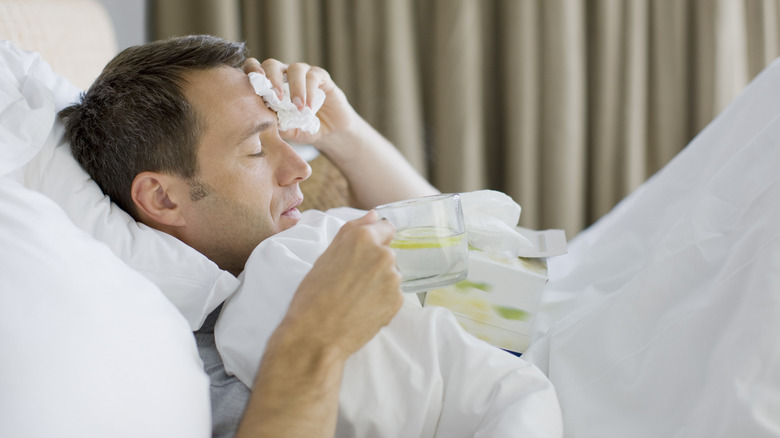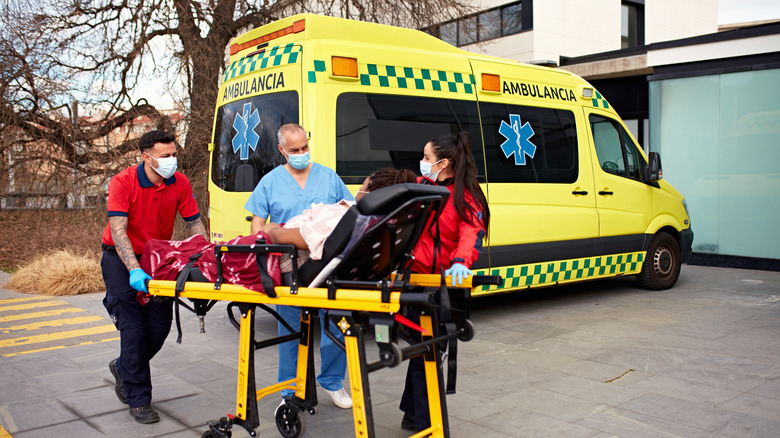Rick Steves' Top Tips For Finding Emergency Medical Care While Traveling In Europe
Sometimes, accidents happen. While it's never fun to think about your European vacation going awry, it's important to be prepared. Even with the best of intentions, you may run into a situation where you need medical attention. In that case, travel expert and guidebook author Rick Steves has some sound advice to help travelers in a bind, courtesy of his blog Rick Steves Europe.
For starters, assess the likelihood of a language barrier and prepare yourself ahead of time. There's an iconic scene in the "Bridget Jones: Edge of Reason" movie in which Bridget (on vacation in the Alps) tries to communicate that she needs a pregnancy test. A very confused pharmacist, who only speaks German, mistakes her condition for bloating, among other things. While this is a funny cinema moment, it's a common fear that many people have while traveling abroad — especially if the circumstances are more serious.
The good news is that most doctors speak at least some English in Europe, says Steves. But just in case, you can always download an app like Google Translate, type in your medical concerns, and have your phone speak the translation out loud to a doctor. You can also look at the directory of doctors on the International Association for Medical Assistance to Travelers (IAMAT) to find English-speaking practitioners near you.
How to find medical help for non-emergencies
In the event of cuts and minor ailments, it's never a bad idea to grab your DIY medical kit (if you packed one). But if you get sick or you have a more significant injury, you may need to seek the help of a professional. Pharmacies in Europe are not like pharmacies in the States, says Steves on his blog. For straightforward issues like an upset stomach, fever, cold, rash, or back pain, a pharmacist can prescribe over-the-counter medication to help you feel better. If you ask for a specific medication you're familiar with, keep in mind that Europeans might call it by a different name. For treatment that's more significant, like heavy-duty medications, x-rays, or tests, you'll be referred to a clinic.
Should you end up with an illness that leaves you bed-bound, like food poisoning, call the front desk of your hotel and ask them to call a house doctor they're familiar with. Although this will be more expensive than a pharmacy or clinic, sometimes it's the best option. For help locating a medical professional, you can call your nearest embassy for a list of clinics and doctors, says the Centers for Disease Control and Prevention (CDC).
What to do in the event of an emergency
In the event of an emergency or life-threatening situation, like a stroke, heart attack, or car accident, immediately call 112. This is the universal emergency number for the European Union, equivalent to 911 in the states. Depending on what your situation calls for, a dispatcher will send police, an ambulance, or a fire truck to your location. If you're in a hotel, restaurant, or museum, you can also ask the front desk to call emergency services as well.
While nearly every European country has a universal health care system, you may incur charges for emergency services, explains Steves via his blog. If you purchased traveler's insurance, call the number and report the incident to start your claim when it's safe to do so. If you don't have traveler's insurance, keep track of all the documentation and charges to sort out with your American insurance company later.
Remember, even though it's scary to have something bad happen abroad, Europe has high-quality medical care, on par — if not better — than what you'll find at home, says Steves. While it doesn't take away the pain of an injury or illness, at least that knowledge can bring you some peace of mind.


